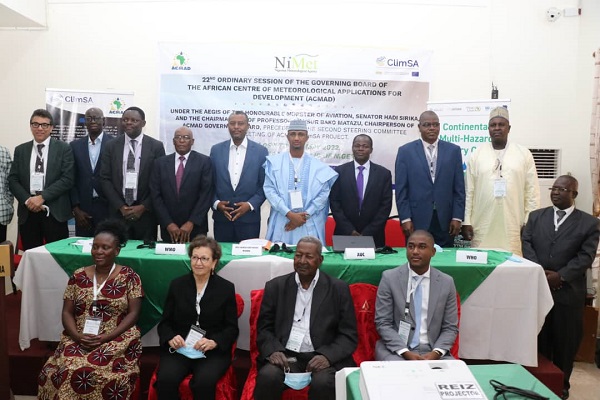…Access to vital funds very low in Africa – Matazu

Member countries of the Intra-ACP [African, Caribbean, Pacific Group of States] Climate Services and Related Applications Programme (ClimSA) and the governing board of African Centre for the Metrological Application for Development (ACMAD) are currently meeting in Abuja to brainstorm on ways of mitigating natural disasters on the African continent.
The member states are deliberating on ways to bridge the gap between early warning and early action in natural disasters exacerbated by climate change at a two-day meeting of the 2nd steering Committee Meeting of ClimSA and the 22nd Ordinary Session of the Governing Board of ACMAD in Abuja.
Speaking at the opening session today (May 5, 2022), the chairperson of the ACMAD governing board, Prof. Mansur Matazu, said the meeting provides the platform to review the first-year report of the European Union ClimSA project, aimed at mitigating disasters and the second-year work plan and budget of the ACMAD-ClimSA project.
He pointed out that Africa is affected much more by disasters because of its low adaptability and low mitigation measures which make it vulnerable.
“The issue of climate change deals with social justice. Most of these climate changes are a result of global warming triggered by industrialisation due to the high emission of greenhouse gases released into the atmosphere. These alter the normal climate variation and climate setting in the world,” he said.
Matazu, who is also the director-general of the Nigerian Metrological Agency (NiMet), further said that to balance this deficit, advanced countries pledged to provide some incentive for climate change adaptation which African countries, unfortunately, have little access to.
“Generally, for Africa, the access to these vital funds is low. That is why NiMet is also assisting other African countries to raise their capacity and come up with products, projects and programmes to access this.
“One of these we are hosting as a country is the ClimSA, the EU-funded project through AUC. NiMet is hosting the ClimSA steering committee meeting to expose other countries to some of our products and programmes on climate change adaptation and mitigation, this will raise their capacity to access these funds,” he added.
In his remarks, the ACMAD director-general, Dr. Andre Foamouhous, restated that climate change is exacerbating vulnerabilities. He cited an example with the 2015/2016 drought over southern Africa, where a very important dam in the region ceased operations because of drought.
He noted that the ClimSA project seeks to strengthen the climate service value chain, therefore contributing to the reduction of weakness across Africa, adding that ClimSA provides technical financial assistance as well as capacity-building to address the climate challenge at the base of ACMAD creation.
“The centre is, more than ever, determined to leverage on the strength of partnerships to better serve member states supporting resilience to disasters across the continent and helping to implement the African Union Agenda 2063 and the Sustainable Development Goals. The centre is at the heart of the effort to build capacity through national-led services to support resilience at country level,” he stated.
Earlier, the director, World Meteorological Organisation (WMO) Regional Office for Africa, Amos Makarau, said the meeting aims to take stock of the assistance that the EU has been giving to Africa through ACMAD and to further spot areas for capacity development, technical and financial support.
He lauded Nigeria for taking a leadership position in meteorological applications, saying the nation has been assisting many countries in Africa.
“One of the issues affecting Africa is disasters. So, we came here as WMO to inform the ACMAD as well as the AUC and other partners that we are preparing a meeting in Mozambique, Maputo, to look at disasters. These are issues in the heart of Africa right now. What we need now is how best we can make sure we can reduce the loss of lives. About 800 million [people] who reside in the rural areas need help.
“So, we want to see how best we can work together to make sure this reaches their level. We are here to take stock of what is happening, particularly, to links between our technical activity and the last mile, men, women and children out there, who are suffering the brunt of extreme weather,” he added.

